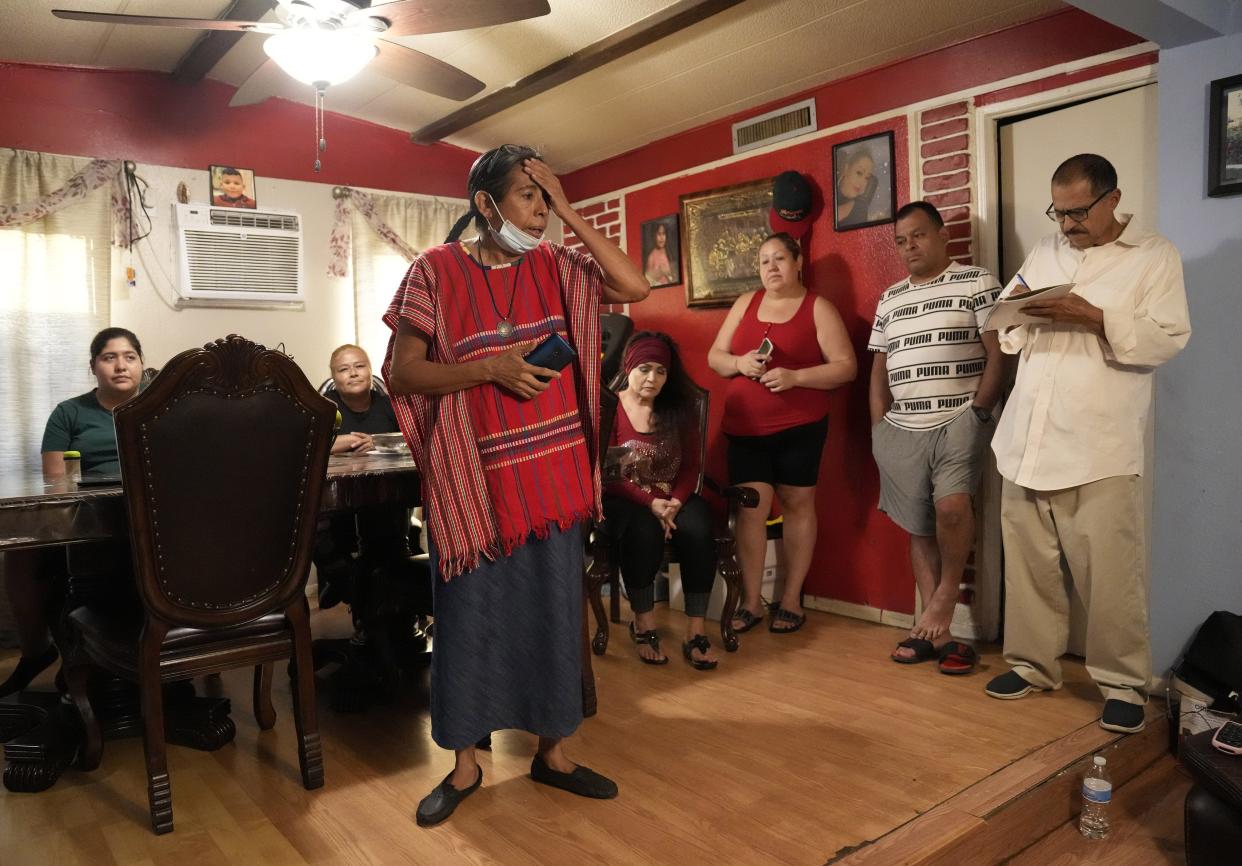Residents are losing their mobile homes, and Phoenix isn't doing enough to help

- Oops!Something went wrong.Please try again later.
Corrections & clarifications: Phoenix Deputy City Manager Alan Stephenson was misidentified in an earlier version of this column.
Families displaced from mobile home parks want the Phoenix City Council to listen to their predicament and at least try do something about it.
But so far, city officials have taken the easy way out, saying they can’t and won’t interfere with private transactions.
That’s not acceptable. The least Mayor Kate Gallego and council members could do is hear residents on a formal agenda.
Since the start of 2021, “at least 30 trailer, manufactured and mobile home parks have sold for almost $260 million” in the greater Phoenix area, according to reporting by The Arizona Republic. Many of those parks are being redeveloped, and while it’s difficult to know how many families have been impacted, potentially thousands of residents with a stable home are being thrown out due to no fault of their own.
They get a letter out of the blue that tells them they have 180 days to vacate, citing Arizona statues and instructions on how they could receive $1,887.50 from a state mobile home relocation fund if they turned in their title to the landlord. Residents pay into this fund every month with their mobile home taxes.
3 mobile home parks highlight the problem
Three high-profile cases in west Phoenix have brought attention to the crisis.
At Periwinkle Mobile Home Park, Grand Canyon University is displacing long-time residents to build student housing, while refusing to compensate them adequately.
Michael Trailor, the president and CEO of Trellis, the organization GCU has hired to handle the relocation, claims GCU is doing more than other corporations because it is offering $5,000, plus 5 months free rent on top of the $1,887.50 offered by the state.
'What they're doing is wrong':GCU housing expansion to force out mobile home residents
But Gerald Suter, one of the residents that refuses to take the offer, says that’s not enough for losing his home.
The other two trailer parks, Las Casitas on 1809 W. Buckeye Road and Weldon Park on 1631 E. Weldon Ave., have been sold to out-of-state corporations that want to scrap the old trailer homes and develop the land into high-priced multifamily housing.
Phoenix officials say their hands are tied
On Oct. 12, when residents of the three parks converged on City Hall after walking from the state Capitol, councilmembers Carlos Garcia, Laura Pastor and Betty Guardado, who represent the affected neighborhoods, urged Gallego to order a study from city staff to see what could be done.
Almost two months later, the staff report offers 12 recommendations, including offering emergency vouchers to help with a deposit and rent, and creating incentives for owners to continue operating mobile home parks.
But Deputy City Manager Alan Stephenson noted in a meeting attended by resident representatives that “there is nothing we can do in creating a zoning overlay relief to prevent speculation because we are interfering with private transactions and state Prop. 207 will force us to compensate private owners for their loss of land value.”
Residents of the three parks subsequently submitted a petition to discuss the matter at a formal city council meeting. But the City Manager’s Office told residents on Nov. 28 that their petition had been rejected.
“City Council does not have any legal basis to interfere or intervene … therefore the action you requested is outside the purview of the City Council,” it read.
Do they fear backlash from developers?
That’s just wrong. Residents aren’t asking the city to intervene in private transactions. Instead, they’re asking councilmembers to publicly discuss remedies for the massive dislocation of families into potential homelessness.
The city should reconsider its position, especially its recommendation not to pursue an exclusive zoning district for mobile home parks. Ultimately, residents want more tools to better protect mobile home parks from land speculation than what Phoenix is willing to provide.
In 2012, the City of Tumwater, Wash., won a decision at the 9th U.S. Circuit Court of Appeals that upheld the city’s mobile home zoning codes, without restricting the ability of landowners to petition for a change of use.
Stephenson admitted, when asked by me in a meeting with residents, that the court’s decision would permit the city to pursue such an action.
So, why not hear about residents’ predicament publicly and consider other legal opinions? Is it because Gallego and council members fear political backlash from developers and landowners?
No doubt poor and displaced residents are less intimidating than millionaire developers with deep pockets and high-powered attorneys.
Salvador Reza is a lifelong community organizer, now helping mobile home park residents fight displacement. He was instrumental in exposing Maricopa County Sheriff's Office racial profiling and organized day laborers to resist. Reach him at srza@aol.com.
This article originally appeared on Arizona Republic: Phoenix must do more to help families booted from mobile home parks

